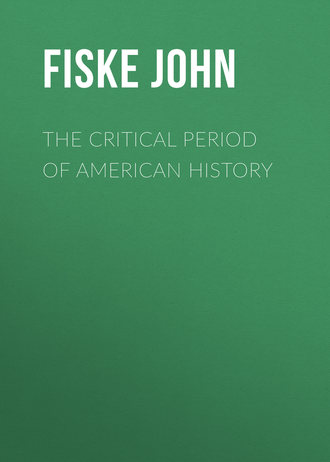 полная версия
полная версияThe Critical Period of American History
Shelburne prime minister.
The Old Whigs now found some difficulty in choosing a leader. Burke was the greatest statesman in the party, but he had not the qualities of a party leader, and his connections were not sufficiently aristocratic. Fox was distrusted by many people for his gross vices, and because of his waywardness in politics. In the dissipated gambler, who cast in his lot first with one party and then with the other, and who had shamefully used his matchless eloquence in defending some of the worst abuses of the time, there seemed as yet but little promise of the great reformer of later years, the Charles Fox who came to be loved and idolized by all enlightened Englishmen. Next to Fox, the ablest leader in the party was the Duke of Richmond, but his advanced views on parliamentary reform put him out of sympathy with the majority of the party. In this embarrassment, the choice fell upon the Duke of Portland, a man of great wealth and small talent, concerning whom Horace Walpole observed, "It is very entertaining that two or three great families should persuade themselves that they have a hereditary and exclusive right of giving us a head without a tongue!" The choice was a weak one, and played directly into the hands of the king. When urged to make the Duke of Portland his prime minister, the king replied that he had already offered that position to Lord Shelburne. Hereupon Fox and Cavendish resigned, but Richmond remained in office, thus virtually breaking his connection with the Old Whigs. Lord Keppel also remained. Many members of the party followed Richmond and went over to Shelburne. William Pitt, now twenty-three years old, succeeded Cavendish as chancellor of the exchequer; Thomas Townshend became secretary of state for home and colonies, and Lord Grantham became foreign secretary. The closing days of Parliament were marked by altercations which showed how wide the breach had grown between the two sections of the Whig party. Fox and Burke believed that Shelburne was not only playing a false part, but was really as subservient to the king as Lord North had been. In a speech ridiculous for its furious invective, Burke compared the new prime minister with Borgia and Catiline. And so Parliament was adjourned on the 11th of July, and did not meet again until December.
French policy opposed to American interests.
The task of making a treaty of peace was simplified both by this change of ministry and by the total defeat of the Spaniards and French at Gibraltar in September. Six months before, England had seemed worsted in every quarter. Now England, though defeated in America, was victorious as regarded France and Spain. The avowed object for which France had entered into alliance with the Americans was to secure the independence of the United States, and this point was now substantially gained. The chief object for which Spain had entered into alliance with France was to drive the English from Gibraltar, and this point was now decidedly lost. France had bound herself not to desist from the war until Spain should recover Gibraltar; but now there was little hope of accomplishing this, except by some fortunate bargain in the treaty, and Vergennes tried to persuade England to cede the great stronghold in exchange for West Florida, which Spain had lately conquered, or for Oran or Guadaloupe. Failing in this, he adopted a plan for satisfying Spain at the expense of the United States; and he did this the more willingly as he had no love for the Americans, and did not wish to see them become too powerful. France had strictly kept her pledges; she had given us valuable and timely aid in gaining our independence; and the sympathies of the French people were entirely with the American cause. But the object of the French government had been simply to humiliate England, and this end was sufficiently accomplished by depriving her of her thirteen colonies.
The valley of the Mississippi; Aranda's prophecy.
The immense territory extending from the Alleghany Mountains to the Mississippi River, and from the border of "West Florida to the Great Lakes, had passed from the hands of France into those of England at the peace of 1763; and by the Quebec Act of 1774 England had declared the southern boundary of Canada to be the Ohio River. At present the whole territory, from Lake Superior down to the southern boundary of what is now Kentucky, belonged to the state of Virginia, whose backwoodsmen had conquered it from England in 1779. In December, 1780, Virginia had provisionally ceded the portion north of the Ohio to the United States, but the cession was not yet completed. The region which is now Tennessee belonged to North Carolina, which had begun to make settlements there as long ago as 1758. The trackless forests included between Tennessee and West Florida were still in the hands of wild tribes of Cherokees and Choctaws, Chickasaws and Creeks. Several thousand pioneers from North Carolina and Virginia had already settled beyond the mountains, and the white population was rapidly increasing. This territory the French government was very unwilling to leave in American hands. The possibility of enormous expansion which it would afford to the new nation was distinctly foreseen by sagacious men. Count Aranda, the representative of Spain in these negotiations, wrote a letter to his king just after the treaty was concluded, in which he uttered this notable prophecy: "This federal republic is born a pygmy. A day will come when it will be a giant, even a colossus, formidable in these countries. Liberty of conscience, the facility for establishing a new population on immense lands, as well as the advantages of the new government, will draw thither farmers and artisans from all the nations. In a few years we shall watch with grief the tyrannical existence of this same colossus." The letter went on to predict that the Americans would presently get possession of Florida and attack Mexico. Similar arguments were doubtless used by Aranda in his interviews with Vergennes, and France, as well as Spain, sought to prevent the growth of the dreaded colossus. To this end Vergennes maintained that the Americans ought to recognize the Quebec Act, and give up to England all the territory north of the Ohio River. The region south of this limit should, he thought, be made an Indian territory, and placed under the protection of Spain and the United States. A line was to be drawn from the mouth of the Cumberland River, following that stream about as far as the site of Nashville, thence running southward to the Tennessee, thence curving eastward nearly to the Alleghanies, and descending through what is now eastern Alabama to the Florida line. The territory to the east of this irregular line was to be under the protection of the United States; the territory to the west of it was to be under the protection of Spain. In this division, the settlers beyond the mountains would retain their connection with the United States, which would not touch the Mississippi River at any point. Vergennes held that this was all the Americans could reasonably demand, and he agreed with Aranda that they had as yet gained no foothold upon the eastern bank of the great river, unmindful of the fact that at that very moment the fortresses at Cahokia and Kaskaskia were occupied by American garrisons.
The Newfoundland fisheries.
Upon another important point the views of the French government were directly opposed to American interests. The right to catch fish on the banks of Newfoundland had been shared by treaty between France and England; and the New England fishermen, as subjects of the king of Great Britain, had participated in this privilege. The matter was of very great importance, not only to New England, but to the United States in general. Not only were the fisheries a source of lucrative trade to the New England people, but they were the training-school of a splendid race of seamen, the nursery of naval heroes whose exploits were by and by to astonish the world. To deprive the Americans of their share in these fisheries was to strike a serious blow at the strength and resources of the new nation. The British government was not inclined to grant the privilege, and on this point Vergennes took sides with England, in order to establish a claim upon her for concessions advantageous to France in some other quarter. With these views, Vergennes secretly aimed at delaying the negotiations; for as long as hostilities were kept up, he might hope to extort from his American allies a recognition of the Spanish claims and a renouncement of the fisheries, simply by threatening to send them no further assistance in men or money. In order to retard the proceedings, he refused to take any steps whatever until the independence of the United States should first be irrevocably acknowledged by Great Britain, without reference to the final settlement of the rest of the treaty. In this Vergennes was supported by Franklin, as well as by Jay, who had lately arrived in Paris to take part in the negotiations. But the reasons of the American commissioners were very different from those of Vergennes. They feared that, if they began to treat before independence was acknowledged, they would be unfairly dealt with by France and Spain, and unable to gain from England the concessions upon which they were determined.
Jay detects the schemes of Vergennes.
Jay soon began to suspect the designs of the French minister. He found that he was sending M. de Rayneval as a secret emissary to Lord Shelburne under an assumed name; he ascertained that the right of the United States to the Mississippi valley was to be denied; and he got hold of a dispatch from Marbois, the French secretary of legation at Philadelphia, to Vergennes, opposing the American claim to the Newfoundland fisheries. As soon as Jay learned these facts, he sent his friend Dr. Benjamin Vaughan to Lord Shelburne to put him on his guard, and while reminding him that it was greatly for the interest of England to dissolve the alliance between America and France, he declared himself ready to begin the negotiations without waiting for the recognition of independence, provided that Oswald's commission should speak of the thirteen United States of America, instead of calling them colonies and naming them separately. This decisive step was taken by Jay on his own responsibility, and without the knowledge of Franklin, who had been averse to anything like a separate negotiation with England. It served to set the ball rolling at once. After meeting the messengers from Jay and Vergennes, Lord Shelburne at once perceived the antagonism that had arisen between the allies, and promptly took advantage of it. A new commission was made out for Oswald, in which the British government first described our country as the United States; and early in October negotiations were begun and proceeded rapidly. On the part of England, the affair was conducted by Oswald, assisted by Strachey and Fitzherbert, who had succeeded Grenville. In the course of the month John Adams arrived in Paris, and a few weeks later Henry Laurens, who had been exchanged for Lord Cornwallis and released from the Tower, was added to the company. Adams had a holy horror of Frenchmen in general, and of Count Vergennes in particular. He shared that common but mistaken view of Frenchmen which regards them as shallow, frivolous, and insincere; and he was indignant at the position taken by Vergennes on the question of the fisheries. In this, John Adams felt as all New Englanders felt, and he realized the importance of the question from a national point of view, as became the man who in later years was to earn lasting renown as one of the chief founders of the American navy. His behaviour on reaching Paris was characteristic. It is said that he left Count Vergennes to learn of his arrival through the newspapers. It was certainly some time before he called upon him, and he took occasion, besides, to express his opinions about republics and monarchies in terms which courtly Frenchmen thought very rude.
Franklin overruled by Jay and Adams.
The arrival of Adams fully decided the matter as to a separate negotiation with England. He agreed with Jay that Vergennes should be kept as far as possible in the dark until everything was cut and dried, and Franklin was reluctantly obliged to yield. The treaty of alliance between France and the United States had expressly stipulated that neither power should ever make peace without the consent of the other, and in view of this Franklin was loth to do anything which might seem like abandoning the ally whose timely interposition had alone enabled Washington to achieve the crowning triumph of Yorktown. In justice to Vergennes, it should be borne in mind that he had kept strict faith with us in regard to every point that had been expressly stipulated; and Franklin, who felt that he understood Frenchmen better than his colleagues, was naturally unwilling to seem behindhand in this respect. At the same time, in regard to matters not expressly stipulated, Vergennes was clearly playing a sharp game against us; and it is undeniable that, without departing technically from the obligations of the alliance, Jay and Adams – two men as honourable as ever lived – played a very sharp defensive game against him. The traditional French subtlety was no match for Yankee shrewdness. The treaty with England was not concluded until the consent of France had been obtained, and thus the express stipulation was respected; but a thorough and detailed agreement was reached as to what the purport of the treaty should be, while our not too friendly ally was kept in the dark. The annals of modern diplomacy have afforded few stranger spectacles. With the indispensable aid of France we had just got the better of England in fight, and now we proceeded amicably to divide territory and commercial privileges with the enemy, and to make arrangements in which the ally was virtually ignored. It ceases to be a paradox, however, when we remember that with the change of government in England some essential conditions of the case were changed. The England against which we had fought was the hostile England of Lord North; the England with which we were now dealing was the friendly England of Shelburne and Pitt. For the moment, the English race, on both sides of the Atlantic, was united in its main purpose and divided only by questions of detail, while the rival colonizing power, which sought to work in a direction contrary to the general interests of English-speaking people, was in great measure disregarded.
The separate American treaty, as agreed upon:
1. Boundaries;
As soon as the problem was thus virtually reduced to a negotiation between the American commissioners and Lord Shelburne's ministry, the air was cleared in a moment. The principal questions had already been discussed between Franklin and Oswald. Independence being first acknowledged, the question of boundaries came up for settlement. England had little interest in regaining the territory between the Alleghanies and the Mississippi, the forts in which were already held by American soldiers, and she relinquished all claim upon it. The Mississippi River thus became the dividing line between the United States and the Spanish possessions, and its navigation was made free alike to British and American ships. Franklin's suggestion of a cession of Canada and Nova Scotia was abandoned without discussion. It was agreed that the boundary line should start at the mouth of the river St. Croix, and, running to a point near Lake Madawaska in the highlands separating the Atlantic watershed from that of the St. Lawrence, should follow these highlands to the head of the Connecticut River, and then descend the middle of the river to the forty-fifth parallel, thence running westward and through the centre of the water communications of the Great Lakes to the Lake of the Woods, thence to the source of the Mississippi, which was supposed to be west of this lake. This line was marked in red ink by Oswald on one of Mitchell's maps of North America, to serve as a memorandum establishing the precise meaning of the words used in the description. It ought to have been accurately fixed in its details by surveys made upon the spot; but no commissioners were appointed for this purpose. The language relating to the northeastern portion of the boundary contained some inaccuracies which were revealed by later surveys, and the map used by Oswald was lost. Hence a further question arose between Great Britain and the United States, which was finally settled by the Ashburton treaty in 1842.
2. Fisheries; commercial intercourse;
The Americans retained the right of catching fish on the banks of Newfoundland and in the Gulf of St. Lawrence, but lost the right of drying their fish on the Newfoundland coast. On the other hand, no permission was given to British subjects to fish on the coasts of the United States. As regarded commercial intercourse, Jay sought to establish complete reciprocal freedom between the two countries, and a clause was proposed to the effect that "all British merchants and merchant ships, on the one hand, shall enjoy in the United States, and in all places belonging to them, the same protection and commercial privileges, and be liable only to the same charges and duties as their own merchants and merchant ships; and, on the other hand, the merchants and merchant ships of the United States shall enjoy in all places belonging to his Britannic Majesty the same protection and commercial privileges, and be liable only to the same charges and duties as British merchants and merchant ships, saving always to the chartered trading companies of Great Britain such exclusive use and trade, and the respective ports and establishments, as neither the other subjects of Great Britain nor any the most favoured nation participate in." Unfortunately for both countries, this liberal provision was rejected on the ground that the ministry had no authority to interfere with the Navigation Act.
3. Private debts;
Only two questions were now left to be disposed of, – the question of paying private debts, and that of compensating the American loyalists for the loss of property and general rough treatment which they had suffered. There were many old debts outstanding from American to British merchants. These had been for the most part incurred before 1775, and while many honest debtors, impoverished during the war, felt unable to pay, there were doubtless many others who were ready to take advantage of circumstances and refuse the payment which they were perfectly able to make. It was scarcely creditable to us that any such question should have arisen. Franklin, indeed, argued that these debts were more than fully offset by damages done to private property by British soldiers: as, for example, in the wanton raids on the coasts of Connecticut and Virginia in 1779, or in Prevost's buccaneering march against Charleston. To cite these atrocities, however, as a reason for the non-payment of debts legitimately owed to innocent merchants in London and Glasgow was to argue as if two wrongs could make a right. The strong sense of John Adams struck at once to the root of the matter. He declared "he had no notion of cheating anybody. The questions of paying debts and compensating Tories were two." This terse statement carried the day, and it was finally decided that all private debts on either side, whether incurred before or after 1775, remained still binding, and must be discharged at their full value in sterling money.
4. Compensation of loyalists.
The last question of all was the one most difficult to settle. There were many loyalists in the United States who had sacrificed everything in the support of the British cause, and it was unquestionably the duty of the British government to make every possible effort to insure them against further injury, and, if practicable, to make good their losses already incurred. From Virginia and the New England states, where they were few in number, they had mostly fled, and their estates had been confiscated. In New York and South Carolina, where they remained in great numbers, they were still waging a desultory war with the patriots, which far exceeded in cruelty and bitterness the struggle between the regular armies. In many cases they had, at the solicitation of the British government, joined the invading army, and been organized into companies and regiments. The regular troops defeated at King's Mountain, and those whom Arnold took with him to Virginia, were nearly all American loyalists. Lord Shelburne felt that it would be wrong to abandon these unfortunate men to the vengeance of their fellow countrymen, and he insisted that the treaty should contain an amnesty clause providing for the restoration of the Tories to their civil rights, with compensation for their confiscated property. However disagreeable such a course might seem to the victorious Americans, there were many precedents for it in European history. It had indeed come to be customary at the close of civil wars, and the effect of such a policy had invariably been good. Cromwell, in his hour of triumph, inflicted no disabilities upon his political enemies; and when Charles II. was restored to the throne the healing effect of the amnesty act then passed was so great that historians sometimes ask what in the world had become of that Puritan party which a moment before had seemed supreme in the land. At the close of the war of the Spanish Succession, the rebellious people of Catalonia were indemnified for their losses, at the request of England, and with a similar good effect. In view of such European precedents, Vergennes agreed with Shelburne as to the propriety of securing compensation and further immunity for the Tories in America. John Adams insinuated that the French minister took this course because he foresaw that the presence of the Tories in the United States would keep the people perpetually divided into a French party and an English party; but such a suspicion was quite uncalled for. There is no reason to suppose that in this instance Vergennes had anything at heart but the interests of humanity and justice.
On the other hand, the Americans brought forward very strong reasons why the Tories should not be indemnified by Congress. First, as Franklin urged, many of them had, by their misrepresentations to the British government, helped to stir up the disputes which led to the war; and as they had made their bed, so they must lie in it. Secondly, such of them as had been concerned in burning and plundering defenceless villages, and wielding the tomahawk in concert with bloodthirsty Indians, deserved no compassion. It was rather for them to make compensation for the misery they had wrought. Thirdly, the confiscated Tory property had passed into the hands of purchasers who had bought it in good faith and could not now be dispossessed, and in many cases it had been distributed here and there and lost sight of. An estimate of the gross amount might be made, and a corresponding sum appropriated for indemnification. But, fourthly, the country was so impoverished by the war that its own soldiers, the brave men whose heroic exertions had won the independence of the United States, were at this moment in sore distress for the want of the pay which Congress could not give them, but to which its honour was sacredly pledged. The American government was clearly bound to pay its just debts to the friends who had suffered so much in its behalf before it should proceed to entertain a chimerical scheme for satisfying its enemies. For, fifthly, any such scheme was in the present instance clearly chimerical. The acts under which Tory property had been confiscated were acts of state legislatures, and Congress had no jurisdiction over such a matter. If restitution was to be made, it must be made by the separate states. The question could not for a moment be entertained by the general government or its agents.
Upon these points the American commissioners were united and inexorable. Various suggestions were offered in vain by the British. Their troops still held the city of New York, and it was doubtful whether the Americans could hope to capture it in another campaign. It was urged that England might fairly claim in exchange for New York a round sum of money wherewith the Tories might be indemnified. It was further urged that certain unappropriated lands in the Mississippi valley might be sold for the same purpose. But the Americans would not hear of buying one of their own cities, whose independence was already acknowledged by the first article of the treaty which recognized the independence of the United States and as for the western lands, they were wanted as a means of paying our own war debts and providing for our veteran soldiers. Several times Shelburne sent word to Paris that he would break off the negotiation unless the loyalist claims were in some way recognized. But the Americans were obdurate. They had one advantage, and knew it. Parliament was soon to meet, and it was doubtful whether Lord Shelburne could command a sufficient majority to remain long in office. He was, accordingly, very anxious to complete the treaty of peace, or at least to detach America from the French alliance, as soon as possible. The American commissioners were also eager to conclude the treaty. They had secured very favourable terms, and were loth to run any risk of spoiling what had been done. Accordingly, they made a proposal in the form of a compromise, which nevertheless settled the point in their favour. The matter, they said, was beyond the jurisdiction of Congress, but they agreed that Congress should recommend to the several states to desist from further proceedings against the Tories, and to reconsider their laws on this subject; it should further recommend that persons with claims upon confiscated lands might be authorized to use legal means of recovering them, and to this end might be allowed to pass to and fro without personal risk for the term of one year. The British commissioners accepted this compromise, unsatisfactory as it was, because it was really impossible to obtain anything better without throwing the whole negotiation overboard. The constitutional difficulty was a real one indeed. As Adams told Oswald, if the point were further insisted upon, Congress would be obliged to refer it to the several states, and no one could tell how long it might be before any decisive result could be reached in this way. Meanwhile, the state of war would continue, and it would be cheaper for England to indemnify the loyalists herself than to pay the war bills for a single month. Franklin added that, if the loyalists were to be indemnified, it would be necessary also to reckon up the damage they had done in burning houses and kidnapping slaves, and then strike a balance between the two accounts; and he gravely suggested that a special commission might be appointed for this purpose. At the prospect of endless discussion which this suggestion involved, the British commissioners gave way and accepted the American terms, although they were frankly told that too much must not be expected from the recommendation of Congress. The articles were signed on the 30th of November, six days before the meeting of Parliament. Hostilities in America were to cease at once, and upon the completion of the treaty the British fleets and armies were to be immediately withdrawn from every place which they held within the limits of the United States. A supplementary and secret article provided that if England, on making peace with Spain, should recover Wept Florida, the northern boundary of that province should be a line running due east from the mouth of the Yazoo River to the Chattahoochee.







